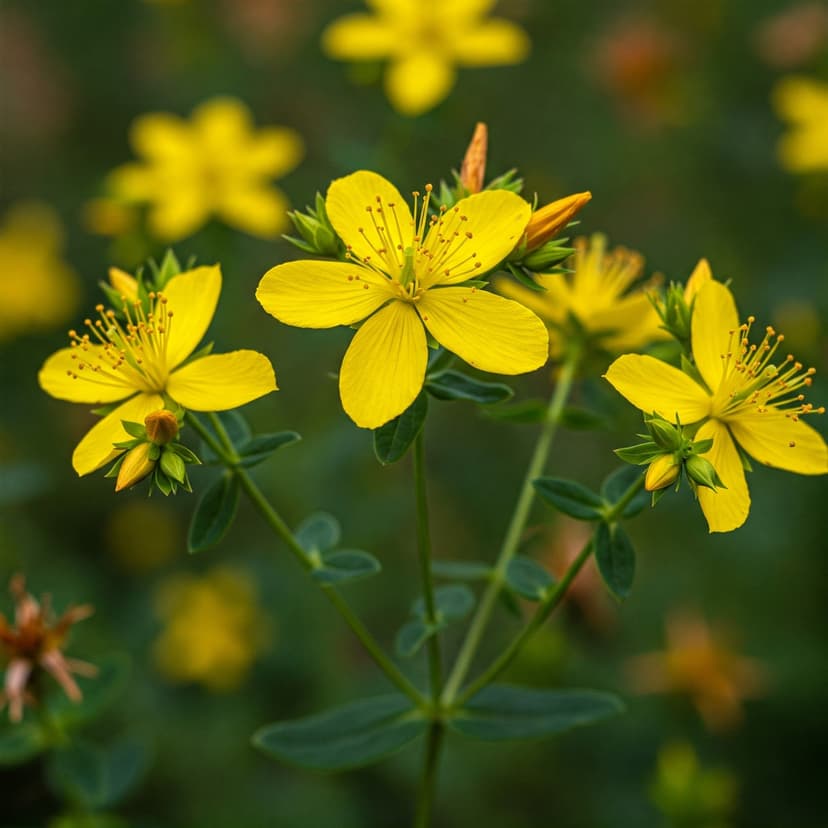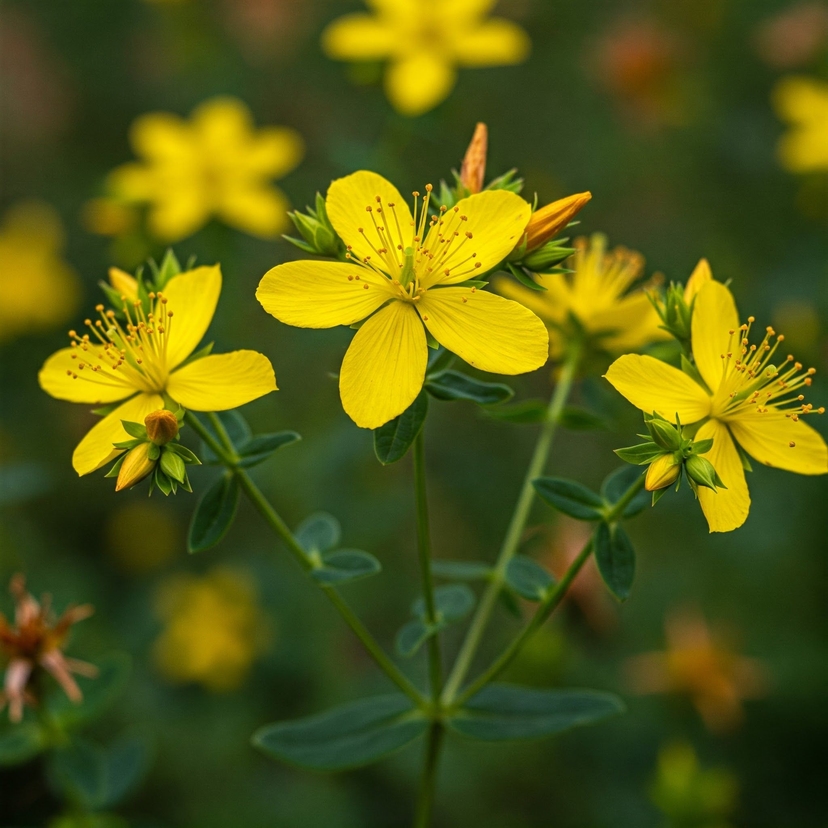

Common Name
St. John’s Wort,
Amber,
Touch-And-Heal,
Goatweed,
Hypericum,
Johnswort
Klamath Weed,
Rosin Rose,
St. John’s Grass,
Tipton Weed,
Racecourse Weed,
Perforate St. John’s Wort
Family
Hypericaceae
Parts Used
Buds, flowers, stems, leaves
Native To
Hypercium perforatum is native to parts of Europe, Asia, North Africa, and the Middle East (Royal Botanic Gardens of Kew [RBGK], n.d.).
Historical and Traditional Uses:
Traditional Medicine: Used in ancient Greek and Roman medicine for treating wounds, burns, and mood disorders. European Folk Medicine: Historically used as a “nerve tonic” and for warding off evil spirits. Wound Healing: Applied topically as an antiseptic for cuts and bruises.
Chemical Composition:
Active Compounds:
- Hypericin: Contributes to antidepressant and antiviral properties.
- Hyperforin: Exhibits antidepressant and antimicrobial effects.
- Flavonoids: Quercetin, rutin, kaempferol (antioxidant properties).
- Tannins: Provide astringent properties.
- Essential Oils: Myrcene, limonene.
Pharmacological Properties:
- Antidepressant: Modulates neurotransmitters like serotonin, dopamine, and norepinephrine.
- Anti-inflammatory: Reduces inflammation in tissues.
- Antimicrobial: Effective against bacteria and viruses.
- Wound Healing: Promotes tissue repair and reduces infection risk.
- Anxiolytic: Relieves symptoms of mild anxiety.
Evidence-Based Uses and Benefits:
- Relieves Symptoms of Depression:
- Effect: Effective in treating mild to moderate depression.
- Key Study: Meta-analysis confirms St. John’s Wort’s efficacy comparable to SSRIs for mild depression.
- Reduces Anxiety and Stress:
- Use: Calms the nervous system and alleviates mild anxiety.
- Supports Wound Healing:
- Effect: Speeds up healing of wounds and burns when applied topically.
- Improves Sleep Quality:
- Mechanism: Modulates melatonin and reduces stress-related insomnia.
- Antiviral Properties:
- Use: Effective against certain viruses, including herpes simplex.
Counter Indications:
- Pregnancy and Breastfeeding: Avoid due to potential hormonal effects.
- Severe Depression: Not recommended as a sole treatment for severe depression.
- Photosensitivity: Increased risk of sunburn or skin irritation in sensitive individuals.
Side Effects:
- Photosensitivity, especially in fair-skinned individuals.
- Mild gastrointestinal upset.
- Dry mouth or dizziness in some cases.
- Rare cases of allergic reactions, including skin rash or itching.
Drug Interactions:
- Antidepressants (SSRIs, MAOIs): May lead to serotonin syndrome.
- Birth Control Pills: May reduce their efficacy.
- Anticoagulants (Warfarin): May decrease effectiveness.
- Antiretrovirals: Reduces effectiveness of HIV medications.
- Sedatives and Anxiolytics: May have additive effects.
- Herbs: Works synergistically with calming adaptogens like ashwagandha but may overstimulate when combined with stimulatory herbs.
Research and White Papers with Links:
- Depressive disorder: (http://www.ncbi.nlm.nih.gov/pubmed/16160619)
- Antibacterial: (http://www.ncbi.nlm.nih.gov/pubmed/20659547)
- Severe depression: (http://www.ncbi.nlm.nih.gov/pubmed/15708844)
- Treatment for depression: (https://www.ncbi.nlm.nih.gov/pmc/articles/PMC9587902/)
- Lung and colorectal cancer risk: (https://aacrjournals.org/cebp/article/18/5/1419/164614/Associations-of-Herbal-and-Specialty-Supplements)
Conclusion
St. John’s Wort is a well-studied herb with significant benefits for mood support, wound healing, and anxiety relief. Its antidepressant properties make it a natural alternative for mild to moderate depression. However, it should be used cautiously due to its potential interactions with medications and photosensitivity risks.


